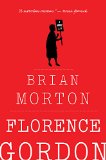Summary | Excerpt | Reading Guide | Discuss | Reviews | Beyond the Book | Readalikes | Genres & Themes | Author Bio

1
Florence Gordon was trying to write a memoir, but she had two strikes against her: she was old and she was an intellectual. And who on earth, she sometimes wondered, would want to read a book about an old intellectual?
Maybe it was three strikes, because not only was she an intellectual, she was a feminist. Which meant that if she ever managed to finish this book, reviewers would inevitably dismiss it as "strident" and "shrill."
If you're an old feminist, anything you say, by definition, is strident and shrill.
She closed her laptop.
Not much point, she thought.
But then she opened it up again.
2
She didn't feel strident or shrill. She didn't even feel old.
And anyway, old age isn't what it used to be — or at least that's what she kept telling herself.
This was her reasoning. Florence was seventy-five years old. In an earlier era, that would have made her an old lady. But not today. She'd been a young woman during the 1960s, and if you were young in the sixties — "bliss was it in that dawn to be alive" — there's a sense in which you can never grow old. You were there when the Beatles came to America; you were there when sex was discovered; you were there when the idea of liberation was born; and even if you end up a cranky old lady who's proud of her activist past but who now just wants to be left alone to read, write, and think — even if you end up like that, there's something in your soul that stays green.
She wasn't — this seems important to say — a woman who tried to look younger than she was. She didn't dye her hair; she had no interest in Botox; she didn't whiten her teeth. Her craggy old-fashioned teeth, rude and honest and unretouched, were good enough for her.
She wasn't a woman who wanted to recapture her youth. In part this was because she found the life she was living now so interesting.
So she was a strong proud independent-minded woman who accepted being old but nevertheless felt essentially young.
She was also, in the opinion of many who knew her, even in the opinion of many who loved her, a complete pain in the neck.
3
She was writing a memoir that began with the early days of the women's movement — the modern women's movement; her own women's movement, the one that had been born in the 1970s. If she could finish it, it would be her seventh book.
Each book had posed its own difficulties. The difficulty with this one was that she was finding it impossible to bring the past to life. Her memory was efficient; she could recall the dates and the acts and the actors. But she was finding it hard to remember the texture of the past.
Tonight she had finally begun, she thought, to crack the code. She'd remembered a moment that she hadn't thought about in years. It was just a moment, not important in itself. But precisely because she hadn't thought about it in so long, she was able to remember it now with a sense of freshness, and she was hoping she might have finally found the door that would lead her back into the past.
She was glad that she was free for the rest of the night. It was seven o'clock on a Friday in early May; she was through with her academic obligations and her mind was clear. And this evening, in which she'd finally, finally, finally, begun to make some progress — this evening was the happiest one she'd had in a long time.
Except that Vanessa kept calling.
Her friend Vanessa kept calling, and Florence kept not picking up. After the fifth call, she thought that Vanessa might be in some sort of trouble, and on the sixth, she finally answered.
"Thank God you're home," Vanessa said. "I've got a problem."
Excerpted from Florence Gordon by Brian Morton. Copyright © 2014 by Brian Morton. Excerpted by permission of Houghton Mifflin Harcourt. All rights reserved. No part of this excerpt may be reproduced or reprinted without permission in writing from the publisher.
Your guide toexceptional books
BookBrowse seeks out and recommends the best in contemporary fiction and nonfiction—books that not only engage and entertain but also deepen our understanding of ourselves and the world around us.